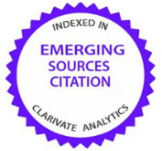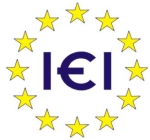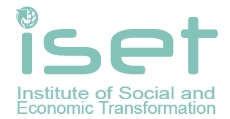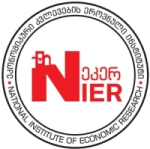Analysis of the Economic and Environmental Policy of Ukrainian Defence Industry Enterprises
Abstract
Introduction. The regulation of economic and environmental impacts of the entire military-industrial complex is a cross-sectoral and international problem. At the same time, research in this area is rather fragmented, which reduces the effectiveness of systematic reviews of the security and defence sector in the context of the green economy. The relevance of the issue of greening the defence industry is significantly enhanced by the need to regulate and operate domestic defence industries in the context of the country's military operations.
Aim and tasks. The aim of the study is to substantiate the economic mechanism for regulating the greening of enterprises of the defence industry of Ukraine.
Results. The economic and environmental security requirements for defence industry enterprises are studied, as the activity of polluting sources of enterprises, including defence enterprises in Ukraine, has generally decreased, in 2021, emissions of pollutants into the atmosphere from stationary sources decreased by 9.0% compared to 2020, to almost 2.2 million tonnes, ammunition was disposed of (235.29 thousand tonnes of ammunition were disposed of from 2014 to 2020) and liquid rocket fuel (16.7 thousand tonnes of melange). In 2021, enterprises, organisations and institutions spent UAH 41.3 billion on environmental protection, compared to UAH 43.7 billion in 2020. Of the total environmental costs in 2021, 68% were current expenses and 32% were capital investments. The strategic directions of greening the defence industry enterprises have been identified, including the introduction of resource-saving technologies, environmental monitoring of environmental impact and reduction of the negative impact of the defence industry units.
Conclusion. The realisation of the greening potential will help protect the country's natural resource potential under the influence of the defence industry. A system of measures should be developed to ensure the protection and restoration of natural systems at a certain cost. Given the importance of the defence industry for the country in the context of current external threats and armed conflicts in certain parts of the territory, it is necessary to develop a strategic vision of environmental security with the involvement of all relevant organisations and taking into account the degree of responsibility and motivation for eco-oriented management.
Keywords:
greening, analysis, dynamics, defence industry, pollutant emissions, environment.References
Ambec, S., Cohen, M. A., Elgie, S., & Lanoie, P. (2013). The Porter hypothesis at 20: Can environmental regulation enhance innovation and competitiveness? Review of Environmental Economics and Policy, 7(1), 2–22. https://doi.org/10.1093/reep/res016
Austin, J., & Bruch, C. (2000). The Environmental Consequences of War: Legal, Economic, and Scientific Perspectives. Cambridge, New York: Cambridge University Press.
Becker, T, B Eichengreen, Y Gorodnichenko, S Guriev, S Johnson, T Mylovanov, K Rogoff, and B Weder di Mauro (2022). A Blueprint for the Reconstruction of Ukraine. Centre for Economic Policy Research. London.
Bochkova S., Bogovych R., Gonchar M., Muron M., Filipovova P., Skalskyi M., & Soroka M. (2020). Air pollution in Ukraine - a view from space. Copernicus atmospheric monitoring services 2017-2020. Prague-Kyiv.
Bondar, Iu.A., & Lehinkova, N.I. (2021). Tооls of activation of innovative development of enterprises of Ukraine. Economy digitalization in a pandemic conditions: processes, strategies, technologies: International scientific conference, January 22-23, 2021. Kielce, Poland, 91-95
Dwight, D. (2008). Eisenhower Military-Industrial Complex Speech. Public Papers of the Presidents. 1961. Avalon Project. https://avalon.law.yale.edu/20th_century/eisenhower001.asp
Eryigit, N., & Özcüre, G. (2015). Eco-innovation as modern era strategy of companies in developing countries: Comparison between Turkey and the European Union. Procedia – Social and Behavioral Science, 195, 1216-1225. https://doi:10.1016/j.sbspro.2015.06.246
EU4Environment. (2022). Towards green transformation of Ukraine: State of Play in 2021 Monitoring progress based on the OECD green growth indicators” https://www.oecd.org/ukraine-hub/policy-responses
Grechanik, R., Malovanyy, M., Korbut, M., Petrushka, K, Luchyt, L., Boyko, R., Synelnikov, S., & Bordun, I. (2023). Environmentally safe reclamation of solid waste landfills. Environmental problems, 8(1), 47-54. https://doi.org/10.23939/ep2023.01.047
Hakim, S., & Makuch, K. (2022). Conflicts of Interest: The Environmental Costs of Modern War and Sanctions. Royal United Services Institute. London.
Hutsaliuk, O., Storozhuk, O., Zhovnirchyk, Ya., Zaiarniuk, O., & Kartsyhin, D. (2020). Public administration and legal regulation effectiveness in the field of health care in the context of sustainable development. Revista Genero & Direito, 9 (2), 599-613.
Jaffe, A. B., Peterson, S. R., Portney, P. R., & Stavins, R. N. (1995). Environmental Regulation and the Competitiveness of U.S. Manufacturing: What Does the Evidence Tell Us? Journal of Economic Literature, 33(1), 132–163.
Koval, V., Kaminskyi, O., Brednyova, V., & Kosharska, L. (2022). Digital Ecosystem Model of Labour Resources Management in Economic Militarism. Revista Gestion de las Personas y Tecnologia,, 15(45), 21. https://doi.org/10.35588/gpt.v14i45.5902
Machlis, G.E., & Hanson, Th. (2008). Warfare Ecology. BioScience, 58(8), 729–736. https://doi.org/10.1641/B580809
Mandryk, O.M., Arkhypova, L.M., Pukish, A.V., Zelmanovych, A. and Yakovlyuk, Kh. (2017). Theoretical and methodological foundations of sustainable development of Geosystems. IOP Conference Series: Materials Science and Engineering, 200, 012018. https://doi.org/10.1088/1757-899X/200/1/012018
Marler, T.E. (2013). Military ecology is more appropriate than warfare ecology. Environmental Conservation, 40 (3), 207-208.
Ministry of Defence of Ukraine (2022). White Paper 2021: Defence Policy of the Armed Forces of Ukraine: Kyiv: Ministry of Defence of Ukraine.
Obnyavko, T.S. (2015). Problems and prospects of greening the economy of the military-industrial complex of Ukraine in modern conditions. Promising problems of economics and management: Collection of scientific articles. BREEZE. Montreal, Canada, 467-473.
OECD. (2022). Environmental impacts of the war in Ukraine and prospects for a green reconstruction Better policies for better lives. 9. https://www.oecd-ilibrary.org
Orel, S., Durach, V., & Naumko, M. (2022). Environmental risk assessment of explosive residues toxicological impact on humans in the former combat area. Environmental problems, 7(1), 14-17. https://doi.org/10.23939/ep2022.01.014.
Quist, M.C., Fay, P.A., Guy, C.S., Knapp, A.K., Rubenstein, B.N. (2003). Military training effects on terrestrial and aquatic communities on a grassland military installation. Ecological Applications, 13, 432-442. https://dx.doi.org/10.6084/m9.figshare.c.3292988
Redkva, O., Koval, V., Filipishyna, L., Vuychenko, M. (2022) Model of ensuring economic security in mechanical engineering. Access to science, business, innovation in digital economy, 3(3), 264-277. https://doi.org/10.46656/access.2022.3.3(6)
Saha, D., Bilek, P., Stubbe, R., Manuel von Mettenheim (2022). Economic reasons for a green reconstruction programme for Ukraine reforms. Berlin Economics. https://voxukraine.org/en/economic-reasons-for-a-green-reconstruction-programme-for-ukraine/
State Emergency Situations Service of Ukraine. (2019). National Report on the State of Technogenic and Natural Safety in Ukraine. https://www.dsns.gov.ua/files/prognoz/report/2018/AO_2018.pdf.
State Statistics Service of Ukraine (2022). http://www.ukrstat.gov.ua/.
Tomasz, Koźluk and Vera, Zipperer (2015). Environmental policies and productivity growth - a critical review of empirical findings. OECD Journal: Economic Studies, 155 – 185.
WHO. (2015). Economic cost of the health impact of air pollution in Europe Clean air, health and wealth. https://www.euro.who.int
Williams, M., Reddy, G., Quinn, M., & Johnson, M. (2015). Wildlife Toxicity Assessments for Chemicals of Military Concern. Elsevier Inc. UK. https://doi.org/10.1016/C2013-0-13473-3
If the article is accepted for publication in the journal «Economics. Ecology. Socium» the author must sign an agreementon transfer of copyright. The agreement is sent to the postal (original) or e-mail address (scanned copy) of the journal editions.





















